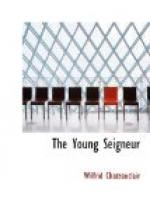CHAPTER XXII.
THE MANUFACTORY OF REFLECTIONS.
Haviland’s approaching election kept him very busy from this time forward, and deluged him with interviews, canvasses, meetings, great and little, and perpetual calls on his attention. His conscientiousness made him work almost unremittingly, for he determined his part in the struggle to be far more than a matter of mere verbiage and smiles. Mr. Chrysler, like a sensible fellow-Member, quite comprehended the situation, and was content to note the admirable way in which his friend did everything; to receive a smile or friendly direction here and there, and to fall back on the attentions of l’Honorable, and the over-zealous Zotique. He felt his entry free, however, to the office where Haviland was principally employed, and which was not uninteresting of itself. There the young man had gathered a library of statistical volumes and other statesman’s lore, with busts of Thiers and Caesar and strangely ideal and unlike the rest,—a pure white classic mask of Minerva on the wall opposite his chair, as if to strike the note of a higher life; while Breboeuf, curious little object, devoured some blue-book in a corner.
Now what were those great aims of Haviland’s? NATION-MAKING, we know in general. But what was the work upon which he was employed as the means?
On the occasion of one of Chrysler’s quiet entries, Haviland rose from his table as the light began to fall, threw off his toils with a breath of relief, and turning towards the older gentleman, called his attention to a large green tin case of pigeon-holes and drawers of different sizes, labelled.
“Here,” he said, “is my manufactory of reflections.”
One compartment was marked “FINANCES,” another “LABOUR,” a small one “DEFENCE,” and a drawer lying open for use was titled “THE UNITY OF RACES.”
“Take out a paper, Mr. Chrysler.”
Chrysler put forth his hand willingly, and withdrawing one, held it to the window and read as follows:
“A great thought can be thought in any place. A great Empire may be planned in any corner.”
The second was a note from “GENERAL NEEDS.”
“What the country most requires is Devoted Men.”
Others read similarly, some long, some short.
“I can show you what will strike you more,” exclaimed Chamilly, in a moment. “I have been planning your visit a little.”
“Have you a geyser or a catacomb?”
“No sir,—a fountain of life,” replied he, jocosely. “Let us get our hats.”
CHAPTER XXIII.
THE STATESMAN’S DREAM.
As they went down the village, he continued to banter.
“You great Ontarians believe too firmly that there is no progress here. According to you there is no being to be met in these forsaken wastes, except a superstitious peasant, clothed all the year in ‘beefs’ and homespun, capped with the tuque, girded with the sash, and carrying the capuchin hood on his shoulders, like the figure on some of our old copper sous;—who sows, after the manner of his fathers, a strip of the field of his grandfathers, and cherishes to his heart every prejudice of his several great, great-grandfathers.”




